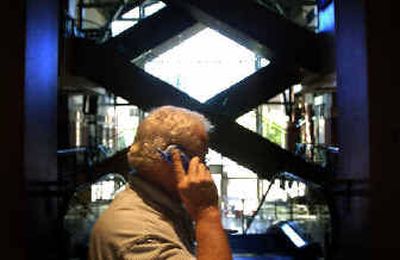Cell companies fighting taxes

OLYMPIA – Spokane school employee Barb Smith opened her cell phone bill last week and scanned down the columns.
A federal excise tax: 94 cents. State and county 911 fees: 70 cents. County sales tax. State sales tax. A payment to the federal universal service fund. And an 86-cent “regulatory programs fee,” Smith said. “Whatever that is.”
All told, her $29.99-a-month T-Mobile wireless plan had $5.52 in taxes and fees tacked onto it.
“It’s absolutely ridiculous,” Smith said. “There are just too many things.”
Across the country, the wireless industry says, cash-strapped states and local governments are increasingly turning to taxes on cell phones and wireless services. South Dakota added a 4 percent gross receipts tax on wireless companies in 2003. Pennsylvania imposed a similar 5 percent tax last year. Louisiana and Portland are considering raising wireless taxes now.
“In recent years, policy-makers have viewed wireless as a way to raise taxes without leaving fingerprints,” said Joe Farren, a spokesman for CTIA-The Wireless Association, an industry group based in Washington, D.C.
The bills are particularly big in Washington state, which has the third-highest wireless taxes in the United States, according to a study by industry economist Scott Mackey. State, local and federal taxes here, he said, average nearly 22 percent – more than twice what they are in Idaho, Montana and Oregon. Only New York and Florida tax wireless services more than Washington.
The industry’s pushing for change in state capitols and Congress, and trying to rally consumer opposition with Web sites like www.stopaddingtomybill.com and www.mywireless.org. Last November, California voters overwhelmingly rejected a ballot measure that would have increased wireless phone taxes.
A big concern for the industry is the growing popularity of computer phone systems like Vonage, which relay sound over high-speed home or office Internet connections, instead of over telephone wires or the airwaves. The phone calls sound the same, but without many of the taxes paid by wireless or regular phone customers.
Wireless companies maintain that they unfairly inherited a tax system designed for traditional phone companies decades ago, when phone companies essentially had a local monopoly over a heavily regulated territory. That made it easy to pass the taxes on to customers, who had no other choice for phone service.
“Most times, the phone company didn’t even list it (tax) in the phone bill,” said Neal Osten, federal affairs counsel with the National Conference of State Legislatures.
The monopolies ended in 1984, he said, but the taxing system never changed.
“When wireless came along, the argument was ‘Well, a phone’s a phone,’ ” said Mackey. But unlike traditional phone companies, he said, wireless providers rarely use a public right-of-way. Instead of a procession of telephone poles marching alongside city streets, wireless companies tend to lease private land to erect their towers on.
“It’s like comparing a grape to a watermelon,” said Farren. “We have nothing in common with the old Ma Bell system.”
There’s a precedent for federal intervention, Osten said. In the 1960s, when railroads were complaining about unusually high state taxes, Congress passed what was called “the Four-R Act,” which said that a state couldn’t tax a railroad at rates higher than those for other businesses. The industry is now pushing for a similar bill for telecommunications, Osten said.
“But the question is: How do you get down to that (level)?” he said.
For cities, the big worry is that wireless companies will succeed in their bid to roll back the taxes. Phone taxes – both regular and wireless – make up about 3 percent of the tax revenue collected by municipalities, according to Stan Finkelstein, executive director of the Association of Washington Cities. That’s nearly $100 million a year.
The money helps pay for all the things that cities provide, he said: law enforcement, fire protection, street maintenance, parks, libraries and so forth. Losing that money, he said, would be akin to 1999’s Initiative 695. The measure prompted lawmakers to roll back license plate tabs to $30 a year and caused a ripple of budget cuts – shorter library hours, laid-off workers, reduced street maintenance – at cities across the state.
Why are Washington’s rates higher than most other states? Because of Washington’s heavy reliance on the sales tax, according to Mackey and industry lobbyists. Unlike most states, Washington has no state income tax. So the sales tax – which is added to wireless phone bills, but not to computer-phone bills – is markedly higher than in most other states.
In Spokane, that sales tax adds nearly $4 a month to Taryn Hutchins’ Verizon cell phone bill. She signed up for a $39.99 plan, and last month paid a total of $9.37 more in surcharges, fees and taxes.
Hutchins wonders what all those fees do, but she said having her cell phone is worth the extra cost.
“It’s a lot of money,” she said, “but I can’t imagine being without it.”